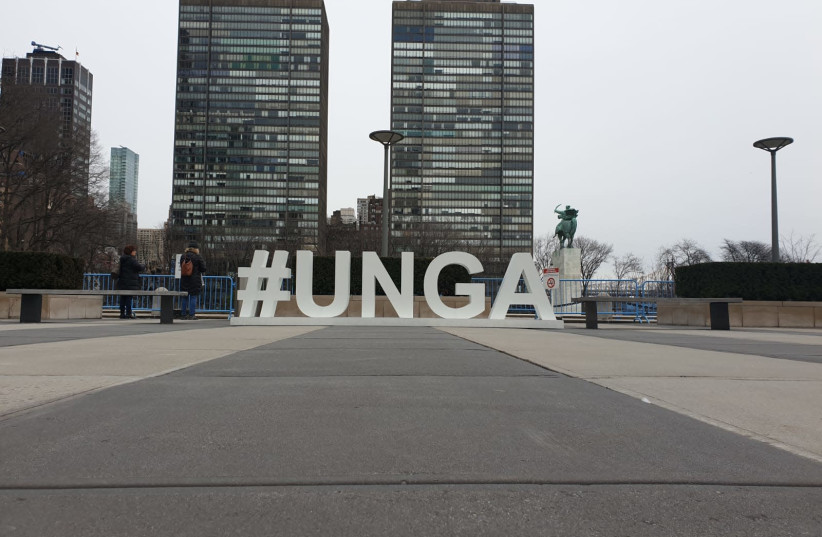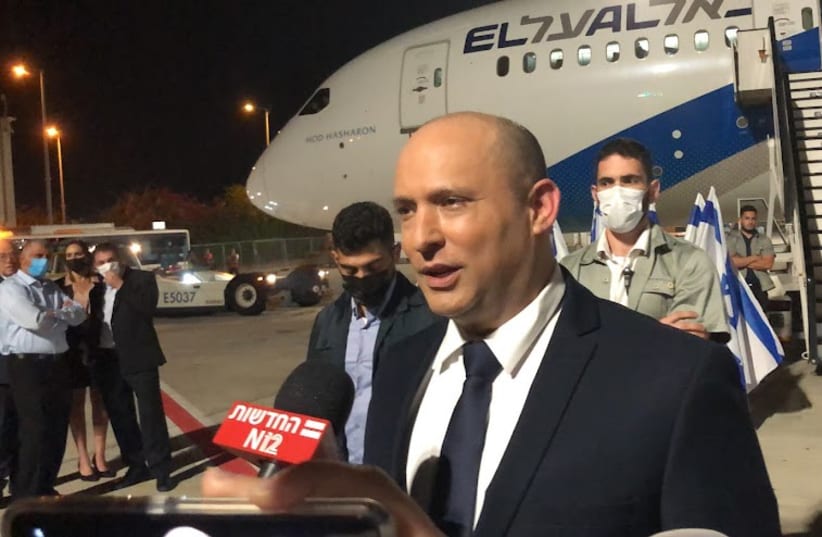The anti-Israel minority in Congress failed to reduce support for Israel, Prime Minister Naftali Bennett said on the tarmac at Ben-Gurion Airport ahead of his trip to the United Nations General Assembly on Saturday night.
Bennett called the vote in the US House of Representatives on Thursday to provide $1bn. to replenish batteries for the Iron Dome missile defense system, with 420 in favor and nine opposed, an "important moment."
ראש הממשלה, נפתלי בנט, נחת לפני זמן קצר בניו יורק לקראת נאומו בעצרת הכללית של האו"םבהמשך היום ייפגש ראש הממשלה עם שר החוץ של בחריין ועם השר לענייני מדינה במשרד החוץ של איחוד האמירויות. pic.twitter.com/Gk76VxtTu0
— ראש ממשלת ישראל (@IsraeliPM_heb) September 26, 2021
"We saw that in the moment of truth, the representatives of the American People overwhelmingly supported Israel," he said.
יצאתי הלילה לעצרת הכללית של האומות המאוחדות.זו הזדמנות לספר את הסיפור שלנו, על המקום של ישראל במרחב, על הרוח המיוחדת של הישראלים ועל התרומה שלנו לעולם. בזמן האחרון היו כמה רגעים חשובים, בראשם הניצחון הגורף בהצבעה בבית הנבחרים האמריקני.<< pic.twitter.com/TW9KP8TQ9q
— Naftali Bennett בנט (@naftalibennett) September 26, 2021
In reference to the left-wing "squad" of members of Congress, which led to the postponement of the Iron Dome vote earlier last week, Bennett added: "There's a small anti-Israel group that makes a lot of noise, but those guys failed."
At the UN, Bennett said that he would "bring the voice of Israelis."
"This is an opportunity to tell our story...of Israel's special spirit and our contribution to the world," he stated.
Bennett said Israel does not define itself by others' standards, and not by the Palestinians or Iran.
"I suggest that their leaders deal with their people and improving their lives and stop their obsession with Israel," he said.
Bennett plans to hold his first meeting with senior ministers from Abraham Accords signatory counties, during his three-day visit to New York, where he will address the UNGA.
Bennett is scheduled to land in the United States early Sunday morning and will meet with Bahrain Foreign Minister Abdullatif bin Rashid Al Zayani and United Arab Emirates Minister of State in the Foreign Ministry Khalifa Shaheen Almarar that evening. These follow meetings he has already held with Jordan's King Abdullah and Egyptian President Abdel Fattah al-Sisi.
The prime minister is also expected to meet with UN Secretary-General Antonio Guterres and US Ambassador to the UN Linda Thomas-Greenfield. He will also speak at a Jewish Federations of North America event, at which leaders of other Jewish Diaspora organizations are expected to be present.
The major focus point of his trip, however, is expected to be his first-ever address at the opening session of the 76th UN Debate scheduled for Monday.
Bennett only entered office in June, so the UNGA provides him an opportunity to introduce himself to the international community.
Bennett plans to speak out against hypocrisy and the double standards to which Israel is held in international forums such as the UN, which passes more resolutions against Israel than any other country.
Contrary to his predecessor Benjamin Netanyahu who often relied on props to add drama to his speeches, Bennett does not plan to use visual aids or other stunts.
Iran will also play a key role in Bennett’s address, but he does not plan to make Israeli intelligence findings public as Netanyahu had done. Rather, he will say that Israel will do all that it takes to stop the ayatollahs’ regime from attaining a nuclear weapon.
Bennett’s UN speech is scheduled to take place at 9 a.m. in New York and 4 p.m. in Israel, before the holiday of Simchat Torah begins on Monday evening. He will stay in the US for only one day of the holiday because he is Israeli; Diaspora Jews observe two days.
He will take the podium at the tail end of the UNGA event that opened on Tuesday. A number of Arab leaders who addressed the forum spoke of the Israeli-Palestinian conflict including Egypt's Sisi and Jordan's King Abdullah who said the status quo was dangerous and should not be maintained.
Most of the speakers at the event paid scant attention to the conflict. Bennett, who has rejected a two-state solution and who has said he would not meet with Abbas, is also not expected to focus on any peace initiative. US President Joe Biden told the UNGA on Tuesday that Israeli and Palestinians were a "long way" from a two-state solution.


At the UNGA on Friday, however, Palestinian Authority President Mahmoud Abbas attempted to push forward a peace process.
He delivered a one-year ultimatum to Israel to withdraw to the pre-1967 lines or risk the PA rescinding its recognition of Israel at those lines.
"Israel, the occupying Power, has one year to withdraw from the Palestinian territory it occupied in 1967, including East Jerusalem," Abbas said.
"If this is not achieved, why maintain recognition of Israel based on the 1967 borders?" Abbas asked.
He warned the PA could shift gear away from a battle over a return to the pre-1967 lines and focus instead on a demand for borders based on the 1947 UN Resolution 181, which had set aside land for an Arab state that included territory the is within the Green Line and is internationally accepted as part of Israeli's sovereign borders. Known as the portion plan, it was accepted by the Jewish leadership but rejected by Arabs nations, which then launched an attack against the nascent Jewish state in what Israelis refer to as the 1948 War of Independence.
Israel's internationally recognized territory is based on the ceasefire lines from that war, which extend beyond what was offered under Resolution 181.
In referencing that history at the UNGA Abbas skipped over the initial Arab rejection to Resolution 181. "We remind everyone that Israel seized by military force half of the land dedicated to the State of Palestine in 1948," Abbas said.
He called for a one-year peace process with Israel to work out details of the withdrawal and a final status agreement based on the 1967 lines.
"We are ready to work throughout this year on the delineation of borders and solving all final status issues under the auspices of the international Quartet and in accordance with United Nations resolutions."
As the first step in that direction, he called on the UN to convene a peace conference based, held under the sole auspices of the Quartet which is composed of the UN, the European Union, the United States and Russia.
In addition to pushing for a two-state solution based on the Resolution 181 borders, Abbas said the PA after a year would also ask the International Court of Justice and asked that they issue an advisory stating that Israel's occupation was illegal under international law.
It's a move, he said, that could threaten the foundations of the Israeli state. "Colonialism and apartheid are prohibited under international law and they are crimes that must be confronted and a regime that needs to be dismantled," Abbas said.
Separately Abbas called on Guterres to develop a mechanism by which Palestinians would be given international protection against Israel and to "activate this mechanism on the borders of the occupied State of Palestine in 1967, including East Jerusalem."
He called on nations that have not yet done so, to unilaterally recognize Palestine as a state.
"I wonder what prevents countries that recognize Israel from recognizing the State of Palestine since they support the two-state solution?
"This is a moment of truth with the occupying Power. We are at a crossroads. We have had enough. This situation cannot continue and our people cannot endure it any longer," Abbas said.
"You cannot claim peace and security for yourselves alone. Leave us be," Abbas exclaimed.
Defense Minister Benny Gantz in an interview Saturday with Channel 13 did not seem rattled by Abbas' ultimatum, noting that in the end Israelis and Palestinians have to work together. Gantz who has met with Abbas said he would speak with him also in the future.
Israel's Ambassador to the UN Gilad Erdan issued a sharp response.
"In his speech at the UN, Abu Mazen proved once again that he is no longer relevant. It is no coincidence that 80% of Palestinians want him to leave his position," Erdan said.
"He once offered to sue the United Kingdom over the Balfour Declaration. Today, he wants to return to the UN Partition Plan. But most important of all, he lied about the Palestinians refusal to make peace.
"Those who truly support peace and negotiations do not threaten delusional ultimatums from the UN platform as he did in his speech," Erdan said.
